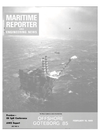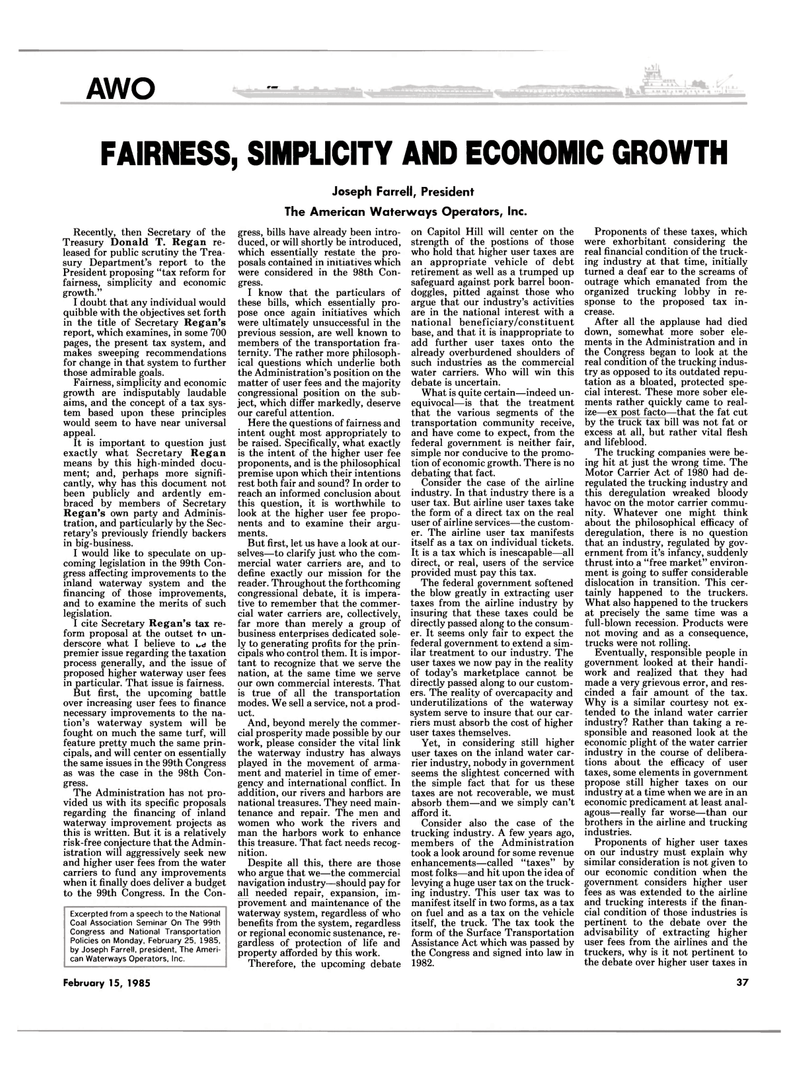
Page 37: of Maritime Reporter Magazine (February 15, 1985)
Read this page in Pdf, Flash or Html5 edition of February 15, 1985 Maritime Reporter Magazine
AWO . sm.
FAIRNESS, SIMPLICITY AND ECONOMIC GROWTH
Joseph Farrell, President
The American Waterways Operators, Inc.
Recently, then Secretary of the
Treasury Donald T. Regan re- leased for public scrutiny the Trea- sury Department's report to the
President proposing "tax reform for fairness, simplicity and economic growth."
I doubt that any individual would quibble with the objectives set forth in the title of Secretary Regan's report, which examines, in some 700 pages, the present tax system, and makes sweeping recommendations for change in that system to further those admirable goals.
Fairness, simplicity and economic growth are indisputably laudable aims, and the concept of a tax sys- tem based upon these principles would seem to have near universal appeal.
It is important to question just exactly what Secretary Regan means by this high-minded docu- ment; and, perhaps more signifi- cantly, why has this document not been publicly and ardently em- braced by members of Secretary
Regan's own party and Adminis- tration, and particularly by the Sec- retary's previously friendly backers in big-business.
I would like to speculate on up- coming legislation in the 99th Con- gress affecting improvements to the inland waterway system and the financing of those improvements, and to examine the merits of such legislation.
I cite Secretary Regan's tax re- form proposal at the outset to un- derscore what I believe to the premier issue regarding the taxation process generally, and the issue of proposed higher waterway user fees in particular. That issue is fairness.
But first, the upcoming battle over increasing user fees to finance necessary improvements to the na- tion's waterway system will be fought on much the same turf, will feature pretty much the same prin- cipals, and will center on essentially the same issues in the 99th Congress as was the case in the 98th Con- gress.
The Administration has not pro- vided us with its specific proposals regarding the financing of inland waterway improvement projects as this is written. But it is a relatively risk-free conjecture that the Admin- istration will aggressively seek new and higher user fees from the water carriers to fund any improvements when it finally does deliver a budget to the 99th Congress. In the Con-
Excerpted from a speech to the National
Coal Association Seminar On The 99th
Congress and National Transportation
Policies on Monday, February 25, 1985, by Joseph Farrell, president, The Ameri- can Waterways Operators, Inc. gress, bills have already been intro- duced, or will shortly be introduced, which essentially restate the pro- posals contained in initiatives which were considered in the 98th Con- gress.
I know that the particulars of these bills, which essentially pro- pose once again initiatives which were ultimately unsuccessful in the previous session, are well known to members of the transportation fra- ternity. The rather more philosoph- ical questions which underlie both the Administration's position on the matter of user fees and the majority congressional position on the sub- ject, which differ markedly, deserve our careful attention.
Here the questions of fairness and intent ought most appropriately to be raised. Specifically, what exactly is the intent of the higher user fee proponents, and is the philosophical premise upon which their intentions rest both fair and sound? In order to reach an informed conclusion about this question, it is worthwhile to look at the higher user fee propo- nents and to examine their argu- ments.
But first, let us have a look at our- selves—to clarify just who the com- mercial water carriers are, and to define exactly our mission for the reader. Throughout the forthcoming congressional debate, it is impera- tive to remember that the commer- cial water carriers are, collectively, far more than merely a group of business enterprises dedicated sole- ly to generating profits for the prin- cipals who control them. It is impor- tant to recognize that we serve the nation, at the same time we serve our own commercial interests. That is true of all the transportation modes. We sell a service, not a prod- uct.
And, beyond merely the commer- cial prosperity made possible by our work, please consider the vital link the waterway industry has always played in the movement of arma- ment and materiel in time of emer- gency and international conflict. In addition, our rivers and harbors are national treasures. They need main- tenance and repair. The men and women who work the rivers and man the harbors work to enhance this treasure. That fact needs recog- nition.
Despite all this, there are those who argue that we—the commercial navigation industry—should pay for all needed repair, expansion, im- provement and maintenance of the waterway system, regardless of who benefits from the system, regardless or regional economic sustenance, re- gardless of protection of life and property afforded by this work.
Therefore, the upcoming debate on Capitol Hill will center on the strength of the postions of those who hold that higher user taxes are an appropriate vehicle of debt retirement as well as a trumped up safeguard against pork barrel boon- doggles, pitted against those who argue that our industry's activities are in the national interest with a national beneficiary/constituent base, and that it is inappropriate to add further user taxes onto the already overburdened shoulders of such industries as the commercial water carriers. Who will win this debate is uncertain.
What is quite certain—indeed un- equivocal—is that the treatment that the various segments of the transportation community receive, and have come to expect, from the federal government is neither fair, simple nor conducive to the promo- tion of economic growth. There is no debating that fact.
Consider the case of the airline industry. In that industry there is a user tax. But airline user taxes take the form of a direct tax on the real user of airline services—the custom- er. The airline user tax manifests itself as a tax on individual tickets.
It is a tax which is inescapable—all direct, or real, users of the service provided must pay this tax.
The federal government softened the blow greatly in extracting user taxes from the airline industry by insuring that these taxes could be directly passed along to the consum- er. It seems only fair to expect the federal government to extend a sim- ilar treatment to our industry. The user taxes we now pay in the reality of today's marketplace cannot be directly passed along to our custom- ers. The reality of overcapacity and underutilizations of the waterway system serve to insure that our car- riers must absorb the cost of higher user taxes themselves.
Yet, in considering still higher user taxes on the inland water car- rier industry, nobody in government seems the slightest concerned with the simple fact that for us these taxes are not recoverable, we must absorb them—and we simply can't afford it.
Consider also the case of the trucking industry. A few years ago, members of the Administration took a look around for some revenue enhancements—called "taxes" by most folks—and hit upon the idea of levying a huge user tax on the truck- ing industry. This user tax was to manifest itself in two forms, as a tax on fuel and as a tax on the vehicle itself, the truck. The tax took the form of the Surface Transportation
Assistance Act which was passed by the Congress and signed into law in 1982.
Proponents of these taxes, which were exhorbitant considering the real financial condition of the truck- ing industry at that time, initially turned a deaf ear to the screams of outrage which emanated from the organized trucking lobby in re- sponse to the proposed tax in- crease.
After all the applause had died down, somewhat more sober ele- ments in the Administration and in the Congress began to look at the real condition of the trucking indus- try as opposed to its outdated repu- tation as a bloated, protected spe- cial interest. These more sober ele- ments rather quickly came to real- ize—ex post facto—that the fat cut by the truck tax bill was not fat or excess at all, but rather vital flesh and lifeblood.
The trucking companies were be- ing hit at just the wrong time. The
Motor Carrier Act of 1980 had de- regulated the trucking industry and this deregulation wreaked bloody havoc on the motor carrier commu- nity. Whatever one might think about the philosophical efficacy of deregulation, there is no question that an industry, regulated by gov- ernment from it's infancy, suddenly thrust into a "free market" environ- ment is going to suffer considerable dislocation in transition. This cer- tainly happened to the truckers.
What also happened to the truckers at precisely the same time was a full-blown recession. Products were not moving and as a consequence, trucks were not rolling.
Eventually, responsible people in government looked at their handi- work and realized that they had made a very grievous error, and res- cinded a fair amount of the tax.
Why is a similar courtesy not ex- tended to the inland water carrier industry? Rather than taking a re- sponsible and reasoned look at the economic plight of the water carrier industry in the course of delibera- tions about the efficacy of user taxes, some elements in government propose still higher taxes on our industry at a time when we are in an economic predicament at least anal- agous—really far worse—than our brothers in the airline and trucking industries.
Proponents of higher user taxes on our industry must explain why similar consideration is not given to our economic condition when the government considers higher user fees as was extended to the airline and trucking interests if the finan- cial condition of those industries is pertinent to the debate over the advisability of extracting higher user fees from the airlines and the truckers, why is it not pertinent to the debate over higher user taxes in
February 15, 1985 37

 36
36

 38
38
